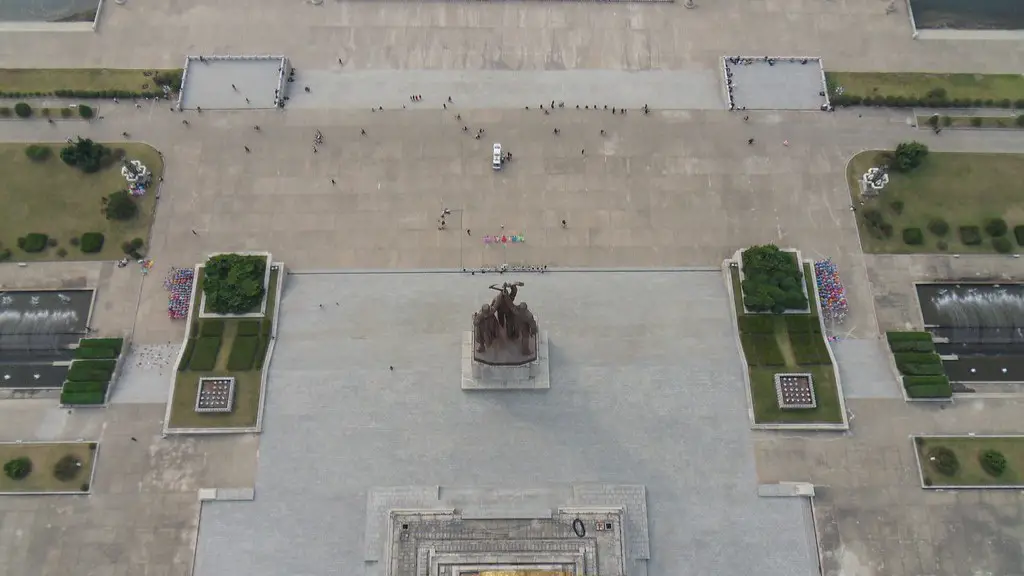History of North Korea’s Rule
North Korea’s government has been made up of a long line of powerful leaders. In 1948, Soviet-backed Kim Il-Sung became the first leader of the Democratic People’s Republic of Korea (DPRK), ruling until his death in 1994. During his rule, Kim Il-Sung consolidated power and continued to pursue an isolationist policy away from the forces of the Western world. He also combined the principles of Marxism-Leninism and juche, an ideology aimed at self-reliance and national autonomy, to create North Korea’s own state-run ideology, known as “Kimilsungism-Kimjongilism”.
Kim Jong-Il, Kim Il-Sung’s son, took control of North Korea in 1994 and would rule for the next 17 years. Under his rue, North Korea maintained the same isolationist policies as before, during which time the economy stalled and anyone who spoke out against the government was harshly punished. He placed a particularly large emphasis on the country’s nuclear program, leading to the 2006 nuclear test — the first by North Korea.
In 2011, Kim Jong-Il passed away and his son, Kim Jong-Un was slated to become the next supreme leader of North Korea. Over the years, Kim Jong-Un has become increasingly popular among the people, with many hailing him as an “eternal leader” due to his development of the Juche ideology and cultivation of the cult personality of the Kim dynasty. He has sought to modernize the North Korean economy and even opened up the country to some foreign investments, despite maintaining a ban on most types of direct foreign investment.
Power of North Korean Regime
Under the rule of Kim Jong-Un, North Korea has cemented its position as a one party state and has maintained a heavy grip on control over the country. To this day, North Korea has not held a single free or fair election since its official formation in 1948, with all candidates having to be approved by the ruling party and dissenters frequently punished by the oppressive regime.
The authoritarian rule of North Korea extends to the daily lives of its citizens, who live under an oppressive network of surveillance and public censure. Freedom of expression and access to information are heavily restricted and punished, with citizens having no access to the Internet and all forms of media censored. Those who oppose the regime are subject to torture, disappearance, or even death, with the regime actively seeking to eliminate any non-loyal citizens.
Geopolitical Influence of North Korea
The political climate of North Korea has had a profound effect on the geopolitics of the region and the world in general. North Korea is seen by many as a rogue state, with its nuclear weapons program, refusal to accept external criticism, and penchant for inflammatory rhetoric creating a high level of tension with its neighbors. This tension has led to a series of sanctions being placed on the country by the United Nations, and even attempts by the United States to engage diplomatically.
Despite the tensions, North Korea has had some level of diplomatic relations with other countries, particularly South Korea and China. In 2018, North and South Korea held their first summit in over a decade, with both sides agreeing to pursue closer ties and the goal of denuclearization. Likewise, North Korea has maintained close ties to China, with China’s help playing a major role in maintaining the current regime and its nuclear weapons program.
Economic Reality of North Korea
Under the rule of Kim Jong-un, North Korea has attempted to modernize its economy and reduce its reliance on foreign aid. Kim Jong-Un has introduced a number of economic reforms, including currency reform, the allowance of some forms of private enterprise, and the implementation of some foreign investment and technological advances.
Despite these advances, North Korea’s economy remains weak and highly dependent on foreign aid. The country has a very low GDP per capita and is heavily reliant on foreign aid, with the majority of its citizens living in extreme poverty. North Korea also faces a major issue with malnutrition and food insecurity, with the United Nations estimating that over 70% of the population is in need of humanitarian aid.
Regulation of North Korea
The government of North Korea has a heavy hand in all aspects of life — from the economy to everyday behavior. To this day, North Korea remains a highly regulated and restrictive state, with the government setting strict limits on the types of behaviors and activities citizens are allowed to engage in. This includes a ban on foreign media, the strict control of everyday information, and the punishment of dissenters.
The government has also set strict limits on access to information and international travel, with citizens required to receive permission from the government to leave the country and access to the Internet heavily restricted. North Koreans are also subject to the country’s surveillance apparatus, with all citizens required to carry a special ID which tracks their movements and all telephone calls being recorded by the government.
Philosophy of North Korea
North Korea’s ideology is primarily derived from the Juche philosophy, which was developed by Kim Il-Sung in the 1950s and emphasizes self-reliance and national autonomy. The essence of this philosophy is that every individual should be free from oppression and interference from foreign powers, with the nation instead focusing on the pursuit of self-reliance.
The philosophy of juche is closely intertwined with the political doctrine of Kimilsungism-Kimjongilism — which is an amalgamation of kimilsungism, a belief system based on the teachings of Kim Il-Sung, and kimjongilism, a belief system based on the teachings of Kim Jong-Il. This belief system seeks to combine the principles of juche with the teachings of both leaders, forming a state-mandated ideology which seeks to promote obedience to the ruling party.
International Relations of North Korea
Although North Korea remains largely isolated from the international community, the government of North Korea has made some efforts to improve diplomatic relations with other countries in an effort to reduce the country’s economic predicament. North Korea has had some success in this regard, as in 2018 it held its first summit with South Korea in over a decade and has maintained close ties to China.
Despite these developments, North Korea remains a highly controversial and isolated state. The country is still subject to a variety of United Nations sanctions, has yet to join the International Criminal Court, and continues to reject any forms of external criticism or intervention. Furthermore, North Korea’s human rights record remains deplorable, with the United Nations accusing the country of committing crimes against humanity on a massive scale.
International Perception of North Korea
The international community’s view of North Korea is one of skepticism and distrust, as the state is widely viewed as an oppressive, authoritarian regime which poses a threat to global peace and stability. In addition, North Korea is seen to be actively pursuing its own interests with little regard for the interests of others, as evidenced by its nuclear weapons program, its tight control over information, and its refusal to allow international inspectors to monitor its activities.
Because of this, North Korea has been subjected to a wide range of sanctions and restrictions, with the United Nations abandoning its attempts to engage diplomatically and issuing a series of resolutions with the aim of curbing the state’s aggressive actions. Despite all of this, North Korea is still seen by some as a potential partner for diplomacy, with countries such as South Korea, China, and even the United States attempting to find a way to engage in dialogue with the isolated nation.


